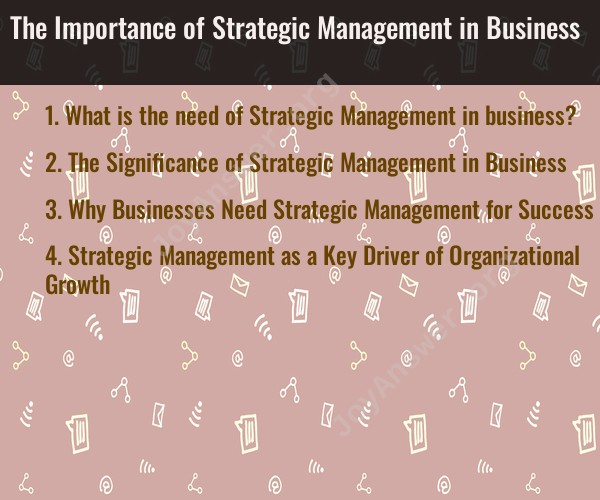What is the need of Strategic Management in business?
Strategic management is a critical function in business that involves the formulation and execution of strategies to achieve organizational goals and objectives. It plays a pivotal role in the success and sustainability of businesses for several reasons:
Direction and Purpose: Strategic management provides a clear sense of direction and purpose for the organization. It helps define the company's vision, mission, and long-term objectives, giving employees a shared understanding of where the organization is headed and why.
Competitive Advantage: Through strategic analysis and planning, businesses can identify their competitive advantages and core competencies. This enables them to leverage strengths and opportunities while mitigating weaknesses and threats, ultimately gaining a competitive edge in the market.
Resource Allocation: Strategic management helps allocate resources (such as capital, personnel, and technology) efficiently and effectively. By aligning resources with strategic priorities, a business can maximize its productivity and return on investment.
Adaptation to Change: In a dynamic business environment, change is constant. Strategic management allows organizations to anticipate and adapt to changes, whether they are related to market shifts, technological advancements, or regulatory updates.
Risk Management: Strategic planning involves identifying and addressing risks. By considering potential risks and developing contingency plans, businesses can minimize the negative impact of unexpected events.
Innovation and Growth: A well-structured strategic management process encourages innovation and growth. It fosters a culture of continuous improvement, helping businesses explore new opportunities and expand into new markets.
Alignment of Efforts: Strategic management aligns the efforts of all employees and departments with the organization's goals. This ensures that everyone is working towards a common objective, reducing conflicts and promoting synergy.
Measurement and Evaluation: Strategic management includes the development of key performance indicators (KPIs) to measure progress. These metrics help businesses track their performance and make informed decisions based on data.
Long-Term Sustainability: By taking a long-term view and considering the impact of decisions on the organization's future, strategic management contributes to the sustainability and longevity of the business.
Stakeholder Engagement: It involves engaging with various stakeholders, including customers, employees, investors, and the community. This fosters trust and enhances the organization's reputation and relationships.
Profitability: Ultimately, effective strategic management aims to enhance the profitability and financial performance of the business. By making informed strategic choices, a company can maximize its revenue and minimize costs.
In summary, strategic management is essential for businesses because it provides a structured approach to decision-making, fosters adaptability in a changing environment, and helps organizations achieve their goals while remaining competitive and sustainable. It is an ongoing process that guides businesses in navigating the complexities of the business world and making informed choices for long-term success.
The Significance of Strategic Management in Business
Strategic management is the process of developing and implementing plans to help an organization achieve its goals and objectives. It is a critical function of any business, as it provides a framework for making decisions that will affect the organization's long-term success.
There are a number of reasons why strategic management is so important for businesses. First, it helps businesses to focus their resources on the most important things. When a business has a clear strategy, it can make decisions about where to invest its time and money, and how to allocate its resources in the most efficient and effective way possible.
Second, strategic management helps businesses to stay ahead of the competition. By understanding the competitive landscape and identifying emerging trends, businesses can develop strategies that will help them to maintain or even gain a competitive advantage.
Third, strategic management helps businesses to adapt to change. The business world is constantly changing, and businesses need to be able to adapt to these changes in order to survive and thrive. Strategic management provides a framework for businesses to assess the changes in their environment and develop strategies to respond to these changes.
Why Businesses Need Strategic Management for Success
Businesses need strategic management for success because it helps them to:
- Set clear goals and objectives
- Develop strategies to achieve those goals and objectives
- Make better decisions
- Allocate resources more effectively
- Stay ahead of the competition
- Adapt to change
Without strategic management, businesses are more likely to be reactive rather than proactive. They may make decisions without fully understanding the consequences, and they may not be able to adapt to changes in their environment as quickly as their competitors.
Strategic Management as a Key Driver of Organizational Growth
Strategic management is a key driver of organizational growth because it helps businesses to:
- Identify and pursue new opportunities
- Develop new products and services
- Enter new markets
- Expand their customer base
- Increase their market share
Strategic management also helps businesses to improve their operational efficiency and profitability. By developing and implementing sound strategies, businesses can reduce costs, improve productivity, and increase their profits.
Overall, strategic management is essential for business success. It helps businesses to set clear goals and objectives, develop strategies to achieve those goals and objectives, make better decisions, allocate resources more effectively, stay ahead of the competition, and adapt to change. Strategic management is also a key driver of organizational growth.
Here are some examples of how strategic management has helped businesses to succeed:
- Amazon: Amazon has been able to dominate the online retail market by developing a clear and concise strategy that focuses on customer satisfaction and innovation.
- Apple: Apple has been able to become one of the most successful technology companies in the world by developing a strong brand identity and focusing on the development of innovative products.
- Walmart: Walmart has been able to become the largest retailer in the world by developing a strategy that focuses on low prices and efficiency.
These are just a few examples of how strategic management has helped businesses to succeed. By developing and implementing a sound strategic plan, businesses can increase their chances of success in the long term.












